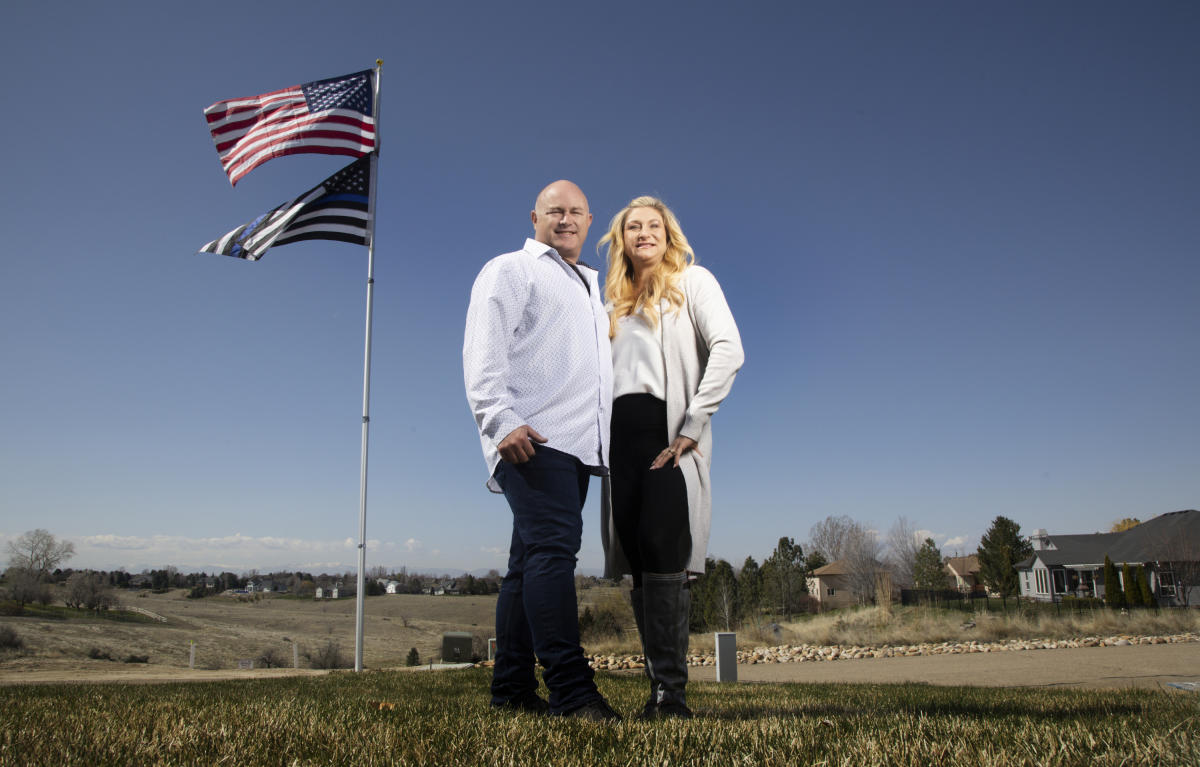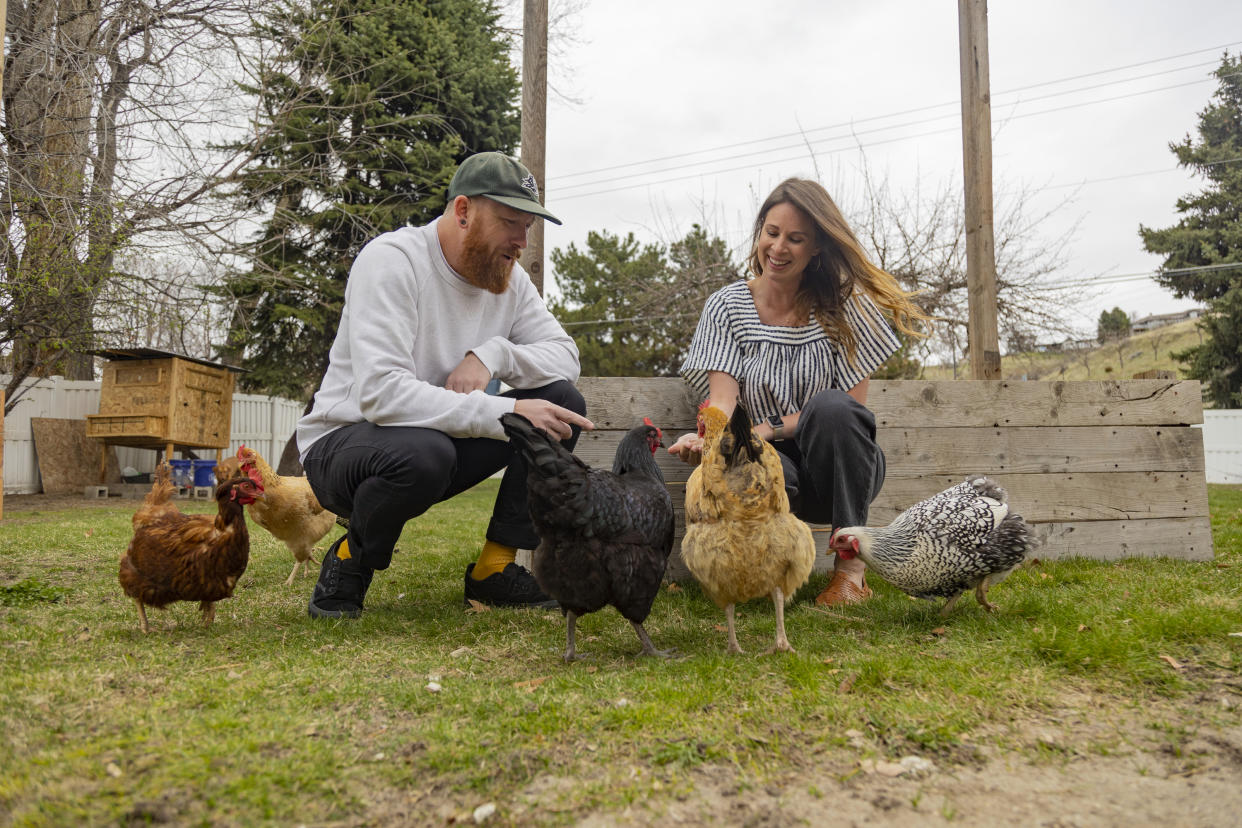#Conservatives go to red states, Democrats to blue as the country grows more polarized


STAR, Idaho (AP) — Once he and his wife Jennifer moved to a Boise suburb last year, Tim Kohl could finally express himself.
Kohl did what the couple never dared at their previous house outside of Los Angeles — the newly-retired Los Angeles police officer flew a U.S. flag and a Thin Blue Line banner representing law enforcement outside his house.
“We were scared to put it up,” Jennifer Kohl acknowledged. But the Kohls knew they had moved to the right place when neighbors complimented him on the display.
Leah Dean is on the opposite end of the political spectrum, but she knows how the Kohls feel. In Texas, Dean had been scared to fly an abortion rights banner outside her house. Around the time the Kohls were house-hunting in Idaho, she and her partner found a place in Denver, where their LGBTQ+ pride flag flies above the banner in front of their house that proclaims “Abortion access is a community responsibility.”
“One thing we have really found is a place to feel comfortable being ourselves,” Dean said.
Americans are segregating by their politics at a rapid clip, helping fuel the greatest divide between the states in modern history.
The split has sent states careening to the political left or right, adopting diametrically opposed laws on some of the hottest issues of the day. In Idaho, abortion is illegal once a heartbeat can be detected in a fetus — around six weeks — and it’s a crime to help a minor travel out of state to obtain one. In Colorado, state law prevents any restrictions on abortion. In Idaho, minors aren’t allowed gender affirming care, while Colorado allows youths to come from other states to access the procedures.
Is federalism driving Americans apart?
Federalism — allowing each state to chart its own course within boundaries set by Congress and the Constitution — is at the core of the U.S. system. It lets the states, in the words of former Supreme Court Justice Louis Brandeis, be “laboratories of democracy.”
Now, some wonder whether that’s driving Americans apart.
“Does that work as well in a time when we are so politically divided, or does it just become an accelerant for people who want to re-segregate?” asked Rob Witwer, a former Republican Colorado state lawmaker.
The states’ swings aren’t simply due to transplants, of course. The increasing clustering of Americans into like-minded enclaves — dubbed “The Big Sort” — has many causes. Harvard professor Ryan Enos estimates that, at least before the pandemic, only 15% of the homogeneity was due to people moving. Other causes include political parties polarizing on hot-button issues that split neatly on demographic lines, such as guns and abortion, and voters adopting their neighbors’ partisanship.
“A lot of this is driven by other sorting that is going on,” Enos said.
Democrats want to live in places with artistic culture and craft breweries, and Republicans want to move to places where they can have a big yard.Political scientist Ryan Strickler
When Americans move, politics is not typically the explicit reason. But the lifestyle choices they make place them in communities dominated by their preferred party.
“Democrats want to live in places with artistic culture and craft breweries, and Republicans want to move to places where they can have a big yard,” said Ryan Strickler, a political scientist at Colorado State University-Pueblo.
But something may have changed as the country has become even more polarized. Businesses catering to conservatives fleeing blue states have sprouted, such as Blue Line Moving, which markets to families fleeing from blue states to Florida. In Texas, a “rainbow underground railroad” run by a Dallas realtor helps LGBTQ+ families flee the state’s increased restrictions targeting that population.
The switch might have been flipped during the coronavirus pandemic in 2020, which created a class of mobile workers no longer bound to the states where their companies were based. Those who are now mobile are predominantly white-collar workers and retirees, the two most politically engaged parts of the national population.
Mike McCarter, who has spearheaded a quixotic campaign to have conservative eastern Oregon become part of Idaho, said most people didn’t pay much attention to state government until the pandemic.
“Then it was like ‘Oh, they can shut down any church and they can shut down my kids’ school?’” McCarter said. “If state-level government has that much power, you’d better be sure it reflects your values, and not someone else’s values that are forced on you.”

The pandemic helped push Aaron and Carrie Friesen to Idaho. They realized they could take their marketing firm remote from its base near Hilton Head, South Carolina. They’d always planned to return to the West, but California, where Aaron, now 39, was born and raised, and Washington state, Carrie’s native state, were both immediately disqualified because of their progressive politics.
The Friesens and their three children settled on Boise. They loved the big skies, the mountains rearing up behind the town, the plethora of outdoor activities.
And they liked Idaho’s pandemic policies. When the Friesens visited, almost no one was wearing masks, which they took as a good sign — they were happy to mask up when sick, but found constant masking pointless.
“With the temperature of politics nowadays, if people choose to move somewhere, they are going to choose to move to a place with like-minded people,” Aaron Friesen said.
That’s apparently been happening in Idaho, said Mathew Hay, who oversees a regular survey of new arrivals for Boise State University. Historically, transplants mirrored the conservative population’s leanings, with about 45% describing themselves as “conservative,” and the rest evenly split between liberal and moderate.
But something changed last year — the share of newcomers saying they came to Idaho for the politics jumped to 9%, compared to 5% for long-timers. The percentage describing themselves as “very conservative” also rose.
In Colorado, the reverse may be happening.
Bret Weinstein, owner of a real estate firm in Denver, said politics has become the top issue for people buying a home.
“It’s brought up in our initial conversations,” Weinstein said. “Three years ago, we didn’t have those conversations, ever.”
If you liked the article, do not forget to share it with your friends. Follow us on Google News too, click on the star and choose us from your favorites.
For forums sites go to Forum.BuradaBiliyorum.Com
If you want to read more News articles, you can visit our News category.



